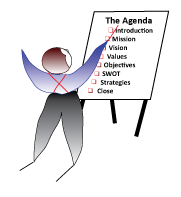November 2011 - The FoCuSeD™ Facilitator eNewsletter

Putting Facilitation Training to Use | Gary Rush Facilitation
There is misconception that Facilitation Training is only for Facilitators. It’s for everyone. Facilitation Training is one of the most critical and most effective tools for improving performance and effectiveness. People, companies, and organizations work smarter when Facilitation skills are incorporated into their culture.
The Problem
Today, the world we live in has become polarized, complex, and demanding. This requires that people, companies, and organizations become flexible, adaptive, and able to tap into all of their resources – especially the collective wisdom of those around them – making the old style of command and control management ineffective. The solution – Facilitation Skills as a core competency.
The Solution – a Core Competency
Facilitation skills are, and should be, a core competency in all positions given that using Facilitation skills increases productivity by more than 25% and improves team performance. Everyone that has been trained in facilitation skills has consistently out-performed those stuck in the old way of doing business.
Some ideas to think about:
- Every organization needs full-time Facilitators. These Facilitators will facilitate strategic plans, team-building, product ideation, and other topics involving a variety of issues. These Facilitators use effective applications of exceptional processes that enable a group of people to come together to accomplish a task, and are capable of facilitating the senior management within their organization.
- Business Analysts should gather requirements in facilitated workshops – Facilitative Business Analysts. Reverting to individual interviews costs the organization money. Facilitated workshops to gather requirements saves 75%!
- Project Managers should facilitate every project meeting. Facilitative Project Managers are skilled at getting the project team to come together and accomplish a great deal of work. Facilitating projects engages the collective wisdom of the project team and stakeholders.
- Auditors should facilitate audits – the information gathering that is required. This will change perceptions of auditors from policing to enabling.
- Managers should be facilitative – Facilitative Managers are effective Leaders and Leaders lead by getting people to come together and accomplish good work. A Facilitative Manager is the best way to ensure success.
- All employees should be trained in Facilitation Skills. This engages staff and stakeholders and helps improve communication. Facilitation skills make a difference in everything you do – in business and in life.
Make it Part of the Culture
When people, companies, and organizations make facilitation part of their culture:
- Plans, requirements, decisions, directions, etc. are developed through facilitated workshops.
- Because facilitation is key to collaboration, Facilitator skills are highly valued.
- Because people, companies, and organizations understand consensus and the decision-making process, they understand the need for divergent ideas, discussion of different perspectives, and convergence to a decision.
- The people in companies and organizations are equal, but not equivalent. They contribute according to their individual strengths and abilities.
- Decisions are made considering input from stakeholders.
- Goals and targets are set based on collaboration and more easily met through collaborating.
- The people in the companies and organizations understand and support decisions because they are involved.
- A larger pool of ideas exists because all members are involved. Brilliant ideas from all parts of the organization will surface and be considered.
- Meetings are run following facilitation guidelines, such as a purpose, an agenda, and ground rules (I know of a CIO who stated that if a meeting was convened without an agenda, attendees had permission to leave). Properly run meetings save organizations over 50% of the cost of meetings in time saved.
- People, companies, and organizations are more adaptable in a changing world.
Summary
Facilitation training costs money but the returns far outweigh the cost. When organizations make Facilitation skills part of their daily practice, they gain far more than they can imagine. When employees use their Facilitation skills, they contribute to the overall well being of the organization. Sounds like win-win. ![]()

